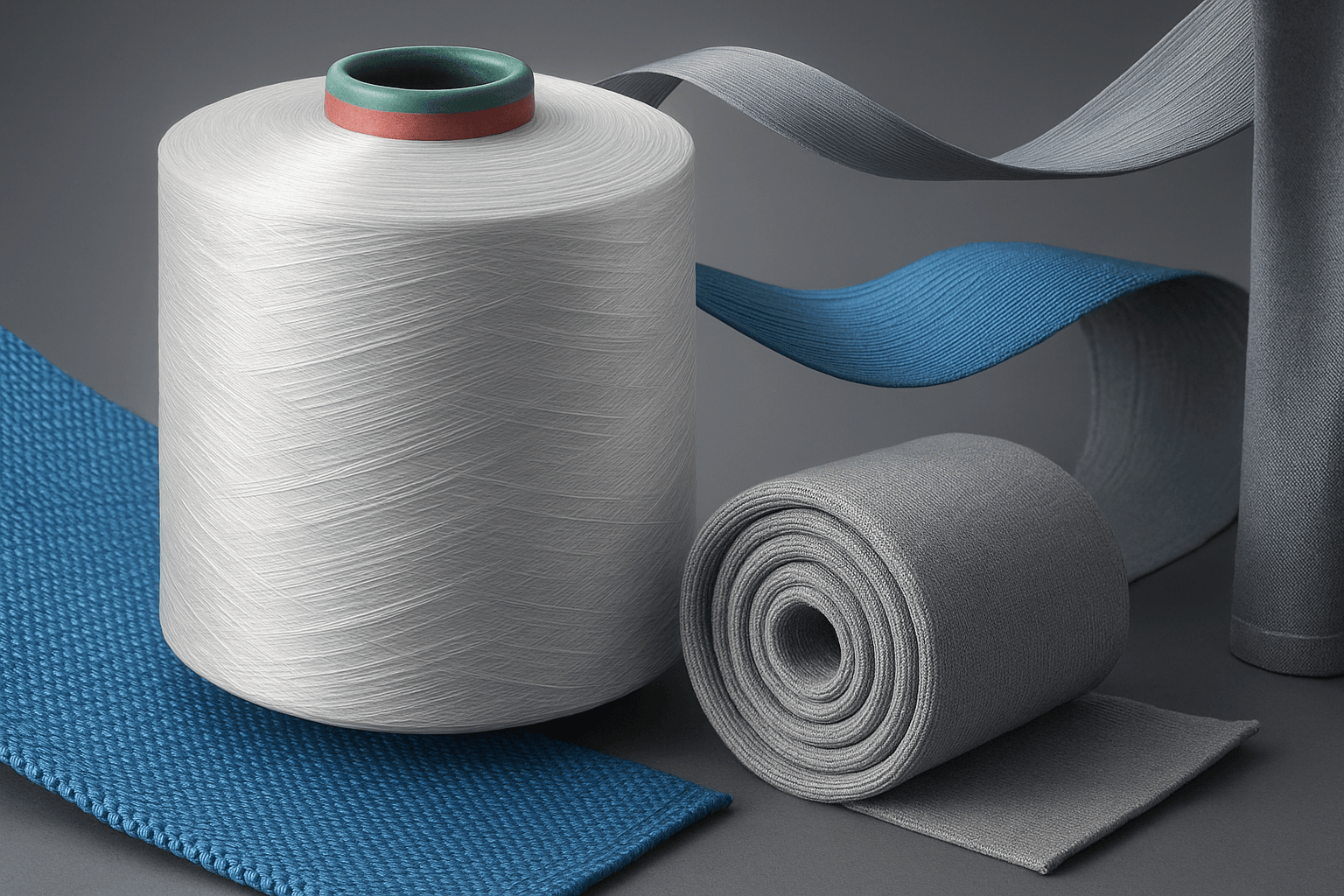You’re pulling on a pair of workout leggings that hug your every move or sinking into a couch that still looks showroom-fresh after years. What’s the magic behind these fabrics? Polyester yarn—the textile world’s quiet superhero. This synthetic fiber weaves strength and stretch into everything from gym gear to curtains, making them tough enough for daily wear and flexible enough for comfort. In Pakistan, where textiles fuel both tradition and global trade, polyester yarn is a star player. This blog unpacks how polyester yarn boosts fabric durability and elasticity, its standout applications, and why it’s a favorite for manufacturers and crafters alike. Whether you’re designing a new line or sourcing from a polyester yarn supplier in Pakistan, let’s dive into why this fiber is stitching together the future of textiles!
What Defines Polyester Yarn?
Polyester yarn is a synthetic fiber crafted from polyethylene terephthalate (PET), spun into threads for weaving or knitting into resilient, flexible fabrics.
- Synthetic Roots – Made from petroleum-based chemicals, polyester is engineered for durability and elasticity, unlike natural fibers like cotton.
- Yarn Varieties – Available as filament (long, continuous strands) or spun (short fibers twisted together), offering options for different textile needs.
- Production Process – PET is melted, extruded into filaments, and textured or spun into yarns with tailored strength and stretch properties.
- Key Characteristics – Known for resisting wrinkles, fading, and wear, polyester yarn suits both everyday and industrial applications.
- Pakistan’s Textile Hub – Yarn suppliers produce polyester in bulk, powering the nation’s clothing and export industries.
Polyester yarn—where strength meets stretch, and style stays sharp.
How Polyester Yarn Fortifies Fabric Durability
Polyester yarn’s robust makeup ensures fabrics can handle the rigors of daily use without losing their form or function.
- Tensile Power – Polyester fibers resist breaking under stress, making fabrics like ropes or bags durable for heavy-duty tasks.
- Wear Resistance – Its ability to withstand friction reduces pilling and tearing, ideal for upholstery or workwear that sees constant use.
- Shape Stability – Polyester fabrics hold their structure, resisting stretching or sagging, perfect for structured jackets or curtains.
- UV Protection – Unlike cotton, polyester resists sun damage, keeping outdoor fabrics like awnings vibrant and intact over time.
- Industrial Demand – Manufacturers source polyester from yarn suppliers for reliable, long-lasting textiles in various sectors.
Why Polyester Yarn Adds Stretch to Fabrics
Polyester yarn’s elasticity transforms fabrics into flexible, body-hugging materials that move with you. When blended with elastomers like spandex, it creates textiles that stretch without losing their original shape, making it a favorite for dynamic applications. Textured polyester yarns are processed to add crimp, enhancing their ability to stretch and recover, which is ideal for sportswear that needs to flex during intense activity. These yarns also maintain elasticity through repeated use, ensuring leggings or swimwear stay snug and supportive. Manufacturers can fine-tune polyester’s stretch by adjusting filament texture or blending ratios, tailoring fabrics for specific needs like fitted dresses or elastic bandages. In Pakistan’s fashion scene, polyester’s stretch makes it a staple for activewear and modern designs, offering comfort and versatility that resonates with consumers.
Comparing Polyester Yarn to Other Fibers
| Fiber Type | Durability | Elasticity | Breathability | Common Uses | Cost (PKR/kg, 2025) |
| Polyester | High, resists wear | High with blends | Low, less airy | Sportswear, upholstery | 200-400 |
| Cotton | Moderate, wears over time | Low, minimal stretch | High, breathable | Shirts, bedding | 300-500 |
| Wool | Strong with care | Moderate, natural stretch | Warm, moderate | Sweaters, scarves | 800-1,200 |
| Silk | Delicate, prone to damage | Low, slight stretch | High, lightweight | Dresses, ties | 2,000-3,000 |
Where Does Polyester Yarn Shine in Applications?
Polyester yarn’s strength and elasticity make it a versatile choice for a wide range of textile products.
- Sportswear – Blends with spandex create stretchy leggings, jerseys, and swimsuits that flex and recover during intense movement.
- Home Furnishings – Durable polyester fabrics cover sofas, cushions, and curtains, resisting stains and fading for lasting appeal.
- Industrial Textiles – Strong polyester yarns form ropes, nets, or conveyor belts, built to endure heavy loads and harsh conditions.
- Fashion Staples – Polyester adds stretch to fitted dresses, suits, or blended traditional garments like shalwar kameez in Pakistan.
- Outdoor Gear – UV-resistant polyester is used in awnings, tents, or bags, maintaining durability in Pakistan’s sunny climate.
Polyester yarn weaves toughness into every thread, stretching comfort into every move.
How Does Polyester Yarn Perform in Pakistan’s Climate?
Pakistan’s diverse weather, from blistering summers to chilly winters, makes polyester yarn a practical textile choice.
- Hot and Humid – Polyester’s quick-drying nature suits coastal areas like Karachi, with blends improving breathability for summer comfort.
- Winter Adaptability – Paired with wool, polyester adds stretch and warmth to shawls or jackets in northern Pakistan’s colder regions.
- Moisture Resistance – Polyester resists mildew, making it ideal for humid climates where natural fibers might degrade.
- Cultural Versatility – Used in vibrant, durable Pakistani garments, polyester blends modern stretch with traditional designs for festivals.
- Local Supply – Yarn suppliers offer polyester in various forms, meeting the needs of fashion, home, and industrial sectors.
Is Polyester Yarn Environmentally Sustainable?
Polyester’s synthetic nature poses environmental challenges, but innovations are making it greener.
- Non-Biodegradable – Made from petroleum, polyester doesn’t break down naturally, contributing to microplastic pollution if not managed.
- Recycling Potential – Recycled polyester from PET bottles reduces waste and energy use by up to 50%, offered by eco-conscious suppliers.
- Lower Water Use – Dyeing polyester uses less water than cotton, though chemical runoff requires careful handling to avoid pollution.
- Energy Concerns – Production is energy-intensive, but sustainable practices like low-impact dyeing are gaining ground in Pakistan.
- Green Alternatives – Suppliers offer recycled or bio-based polyester, aligning with global trends for eco-friendly textiles.
Polyester yarn can be a sustainability star when we weave recycling into its story.
How Does Polyester Yarn Affect Textile Costs?
Polyester yarn’s affordability makes it a cost-effective choice for manufacturers and consumers.
- Low Production Costs – Cheaper than wool or silk, polyester reduces expenses for mass-produced clothing or home textiles.
- Efficient Manufacturing – Its strength allows faster weaving, cutting labor and machine costs in textile production.
- Durability Savings – Long-lasting polyester fabrics lower replacement costs for items like furniture covers or workwear.
- Recycled Options – Using recycled polyester cuts raw material costs, with Pakistan’s suppliers offering budget-friendly choices.
- Market Availability – Bulk supply from polyester yarn suppliers in Pakistan ensures cost-effective access for large-scale projects.
How to Select a Polyester Yarn Supplier in Pakistan?
Choosing a reliable supplier ensures quality polyester yarn for your textile needs.
- Diverse Yarn Types – Seek suppliers offering filament, spun, and blended polyester for fashion, upholstery, or industrial applications.
- Consistent Quality – Trusted suppliers provide tested yarns with uniform strength and elasticity for reliable fabric outcomes.
- Local Expertise – Suppliers familiar with Pakistan’s textile market can suggest yarns for cultural designs or modern activewear.
- Reliable Delivery – Choose suppliers with efficient logistics to meet production deadlines, avoiding costly delays for manufacturers.
- Eco-Friendly Offerings – Opt for suppliers with recycled or sustainably dyed polyester to meet global environmental standards.
What Lies Ahead for Polyester Yarn in Textiles?
Polyester yarn is poised for a future that balances performance with sustainability.
- Recycled Innovations – Recycled polyester from plastic waste reduces environmental impact, with growing adoption in Pakistan’s textile sector.
- Smart Fabrics – Polyester is being engineered for conductive or heat-resistant properties, used in wearable tech or protective gear.
- Green Production – Low-impact dyes and energy-efficient spinning cut polyester’s environmental footprint, aligning with global trends.
- Export Growth – Pakistan’s polyester yarn fuels global demand for durable, stretchy textiles, boosting the country’s textile exports.
- Technological Advances – Automated texturing and spinning enhance yarn quality, supporting faster, sustainable textile production.
Polyester yarn stretches the limits of textiles, blending strength, flexibility, and a greener tomorrow.
FAQs About Polyester Yarn
How does polyester yarn differ from natural fibers?
Polyester is synthetic, offering superior strength and stretch, while natural fibers like cotton are breathable but less elastic and durable.
Why does polyester yarn enhance fabric strength?
Its high tensile strength and resistance to abrasion make fabrics like upholstery or ropes tough against wear and tear.
How does polyester yarn improve elasticity?
Textured polyester or spandex blends provide stretch and recovery, ideal for activewear or fitted garments that move with the body.
Is polyester yarn suitable for Pakistan’s climate?
Yes, its quick-drying nature suits humid areas, while blends with wool add warmth for winter, and cotton blends enhance summer comfort.
How do I care for polyester fabrics?
Wash with mild detergent on a gentle cycle, dry on low heat or air dry, and avoid high heat to preserve shape and elasticity.
Where can I find a polyester yarn supplier in Pakistan?
Look for suppliers in Faisalabad or Karachi, offering tested, sustainable polyester yarns for fashion, home, or industrial use.
Is polyester yarn eco-friendly?
While non-biodegradable, recycled polyester and eco-friendly dyeing reduce its impact, available from select Pakistani suppliers.
What are the top uses for polyester yarn?
It excels in sportswear, upholstery, curtains, and industrial textiles like ropes, thanks to its durability and stretch.
Wrapping Up
Polyester yarn weaves strength and elasticity into the heart of textiles, creating fabrics that endure wear and stretch with ease. From stretchy sportswear to durable upholstery, its versatility powers Pakistan’s textile industry, blending modern functionality with cultural designs. While environmental challenges persist, recycled polyester and sustainable practices are shaping a greener future. Whether you’re crafting a bold new design or scaling up production, yarn suppliers provide the materials to make it happen. Ready to create textiles that last and flex? Connect with a trusted supplier and let polyester yarn weave your vision into reality!



